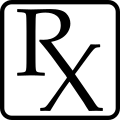Prescription facts for kids
A prescription (℞) is a message given by a doctor to a patient saying what to do. It may say to get special medicine that is only for people with a prescription. Those drugs are often very strong, and they cannot be bought normally from a pharmacy as you could with over-the-counter drugs.
In North America, ℞, usually printed as "Rx", is used as an abbreviation of the word "prescription". It is a contraction of the Latin word "recipe" (an imperative form of "recipere") meaning "take". Prescription drugs are often dispensed together with a monograph (in Europe, a Patient Information Leaflet or PIL) that gives detailed information about the drug.
United States
In the United States, the federal government authorizes physicians (of any specialty), physician assistants, nurse practitioners and other advanced practice nurses, veterinarians, dentists, and optometrists to prescribe any controlled substance. They are then issued unique DEA numbers. Legend drugs are another name for drugs requiring a prescription.
Misuse or abuse of prescription drugs can result in addiction, illness and death.
The package insert for a prescription drug contains information about the intended effect of the drug and how it works in the body. It also contains information about side effects, how a patient should take the drug, and cautions for its use, including warnings about allergies.
Herbal preparations, amino acids, vitamins, minerals, and other food supplements are regulated by the FDA as dietary supplements. Because specific health claims cannot be made, the consumer must make informed decisions when purchasing such products.
Environment
Traces of prescription drugs — including antibiotics, anti-convulsants and mood stabilizers — have been detected in drinking water. Pharmaceutically active compounds (PhACs) discarded from human therapy and their metabolites have been found to not be eliminated by sewage treatment plants and have been found at low concentrations in surface waters downstream from those plants. The continuous discarding of incompletely treated water may interact with other environmental chemicals and lead to uncertain ecological effects. Due to most pharmaceuticals being highly soluble, fish and other aquatic organisms are susceptible to their effects. The long term effects of pharmaceuticals in the environment may affect survival and reproduction of such organisms. However, levels of medical drug waste in the water is at a low enough level that it is not a direct concern to human health. However, processes, there is clear evidence of harm to aquatic animals and fauna.
Currently, research is being done on various methods of reducing chemical waste in the environment. In addition, FDA established guidelines in 2007 to inform consumers should dispose of prescription drugs. When medications do not include specific disposal instructions, patients should not flush medications in the toilet, but instead use medication take-back programs. This aims to reduce the amount of pharmaceutical waste that gets into sewage and landfills.
See also
 In Spanish: Prescripción para niños
In Spanish: Prescripción para niños
- Package insert
- Pharmacy (shop)
- Pharmacy automation


